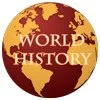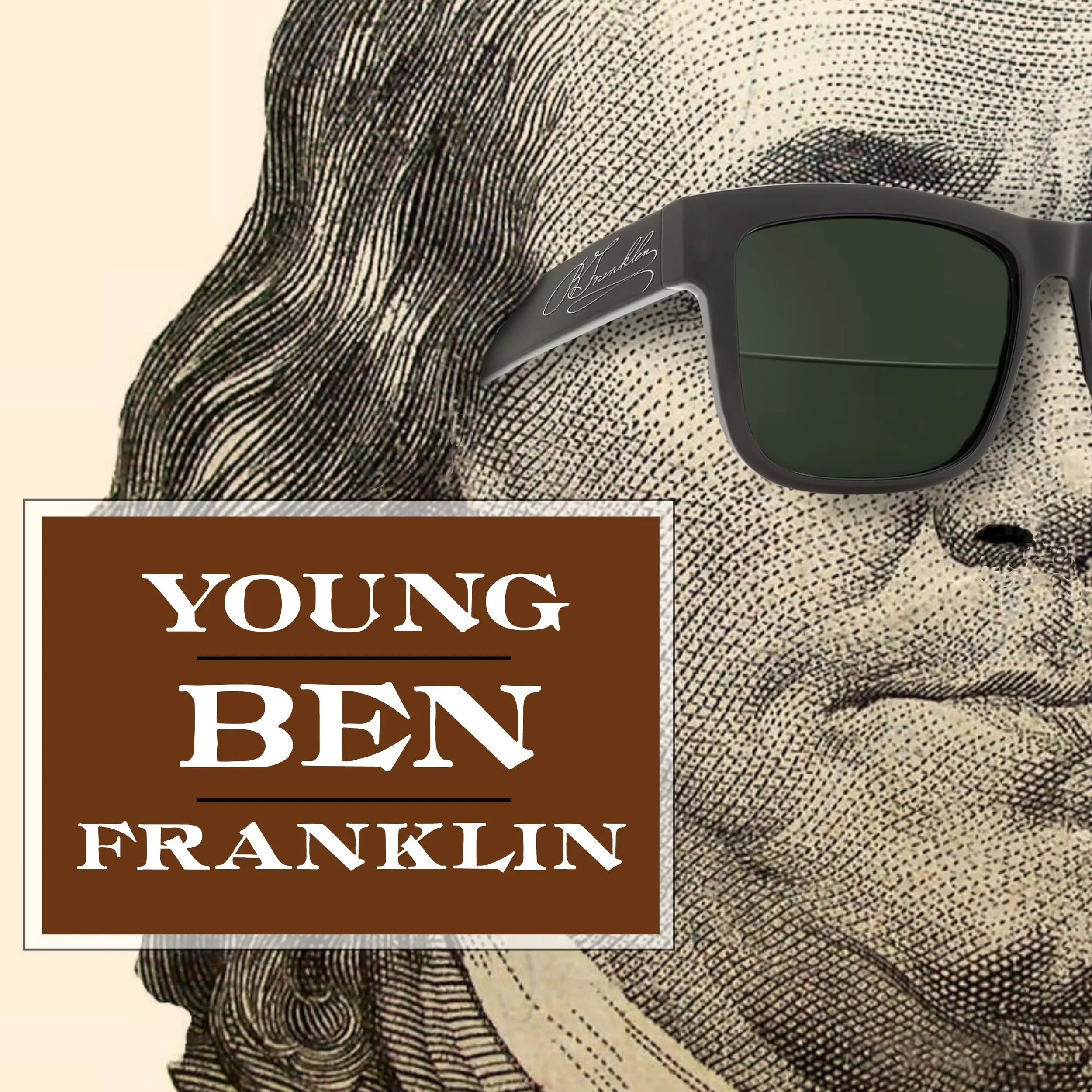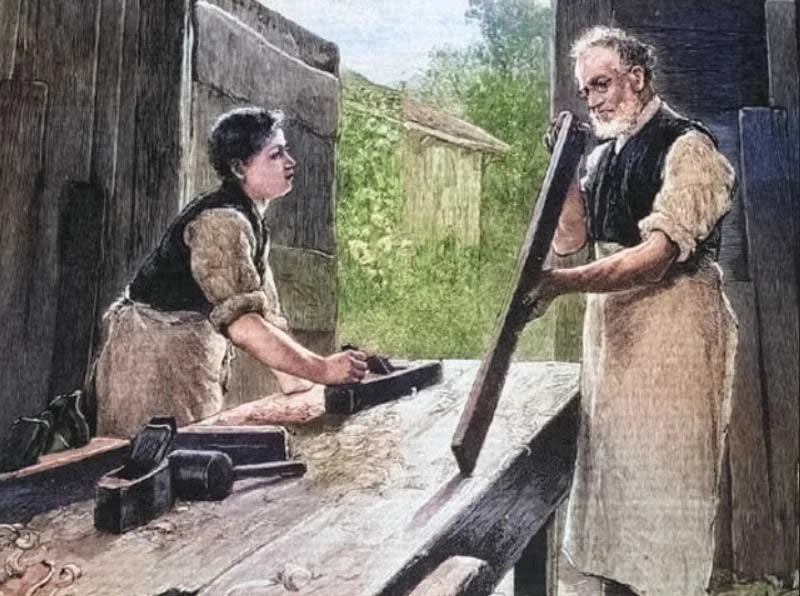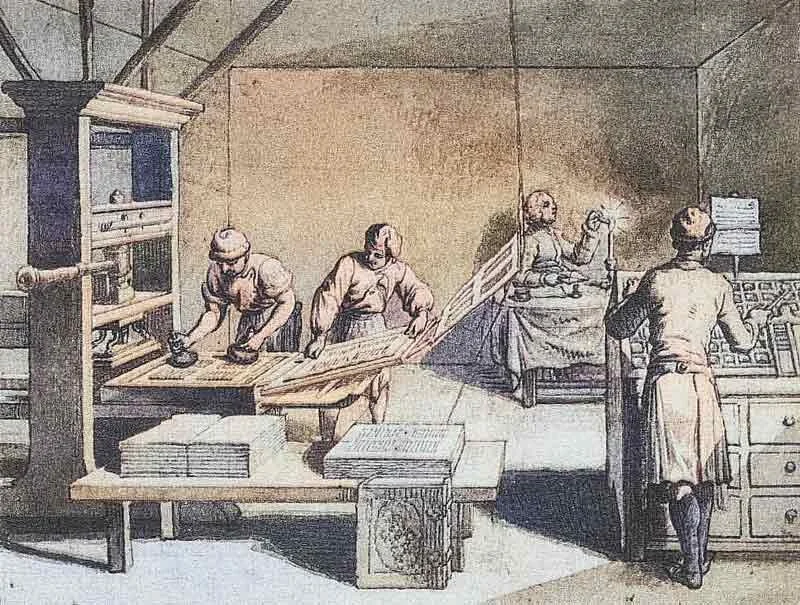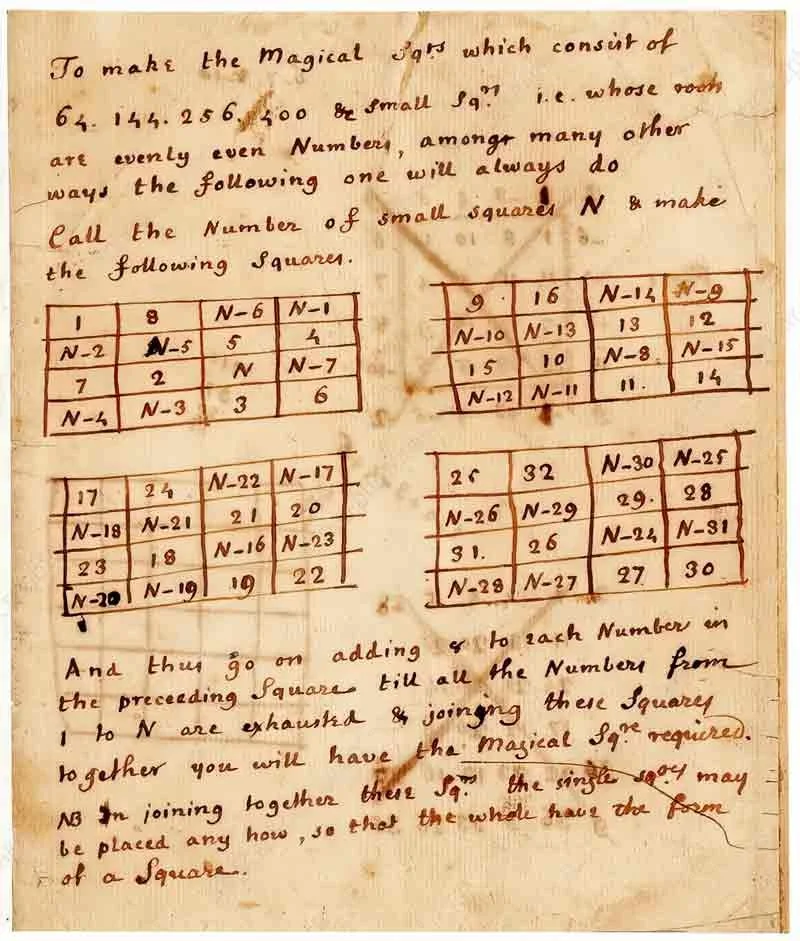What’s the Big Idea, Ben Franklin?
• Read •
What’s the Big Idea, Ben Franklin?
A Special Boy
Benjamin Franklin was his father’s tenth and last son.
He came from a long line of “youngest sons,” which made his father think Benjamin was special. Benjamin was smart, so Mr. Franklin decided he should not become just another “Leather Apron” worker. Instead, he hoped Benjamin would become a preacher.
At age seven, Benjamin was sent to Latin School. By the end of the year, he was at the top of his class.
But Mr. Franklin began to worry. It would take many years and a lot of money to turn Benjamin into a preacher.
Also, he had noticed that many young preachers worked in small churches and were poor. Some even had holes in their shoes. Mr. Franklin didn’t want to spend money for Benjamin to end up like that.
So he took Benjamin out of Latin School and sent him to a regular writing and arithmetic school instead.
After two years, when Benjamin was ten, Mr. Franklin took him out of school completely so he could run errands, deliver soap, and help dip candles.
• These persons are about 10 years old.
Choosing a Trade
When Benjamin turned twelve, it was time to choose a trade.
That meant he would become an apprentice. Apprentices had to sign a paper promising to obey their master until age twenty-one. They had to work whenever they were told and keep all of their master’s secrets.
Benjamin did not like the idea of losing nine years of freedom.
• An apprentice carpenter in colonial times.
So he told his father he might go to sea. Mr. Franklin strongly disagreed. He reminded Benjamin that a family member who went to sea had a very hard life.
• The kind of ship young Benjamin might have gone to sea on.
If Benjamin didn’t want to be an apprentice, he should stay home and join the family business.
But Benjamin did not like the soap and candle business. The grease for candles smelled terrible, and the boiling lye for soap stung his nose. Benjamin didn’t want to smell these things all his life.
Mr. Franklin took him around Boston to look at different trades—how hatters made hats, how cutlers made knives, and how coopers made barrels. Benjamin thought the trades were interesting, but each one required becoming an apprentice. He still said no.
Finally, after much arguing, Mr. Franklin convinced Benjamin to become an apprentice to his older brother James, a printer.
Learning & Growing
Benjamin learned printing quickly, just as he expected. But being an apprentice to his brother was as difficult as he feared. James thought Benjamin was vain and argumentative, and he often treated him more strictly than other apprentices.
Benjamin did not want to waste all those years, so he decided to use every spare moment to learn. He read, wrote, watched, and tried out new ideas.
He tried writing poetry, but his father told him to “stick to prose.” To practice, Benjamin read essays, turned them into poems, then turned them back into prose weeks later. This helped him grow his vocabulary.
Later, he even wrote letters for James’s newspaper under the fake name “Silence Dogood.”
Benjamin read a book on vegetarianism and stopped eating meat. He asked James to give him half the money James spent on his meals. That way, Benjamin could eat simply, read while eating, and use the extra money to buy books.
• Print shop in colonial America.
He also read books on swimming and learned many strange and difficult swimming tricks. He even made wooden paddles for his hands and feet to swim faster, though they were too heavy to use for long. Later, he used a kite as a sail to pull himself across a pond—although because boys swam naked in those days, he needed a trustworthy friend to carry his clothes to the other side of the mile-wide pond.
Benjamin also studied arithmetic, which he had failed earlier in school. Later he enjoyed making “magic squares,” arranging numbers so many different rows added up to the same total—260.
• Franklin's magic squares. 18th Century document by Benjamin Franklin, describing the method for making 'magical squares'. A magic square is an arrangement of numbers in a square grid, where the numbers in each row and each column, and the numbers in the main and secondary diagonals, all add up to the same number.
He read a book about how to argue politely by asking questions instead of directly disagreeing. He tried it and discovered it worked. He also read a book from England full of odd advice, such as how to catch eels, cure deafness, and stop horses from having nightmares.
Benjamin loved books that taught people how to do things.
He liked thinking about how to make work easier, life more comfortable, and how to get ahead. He even read a book about how to be good. He made a list of thirteen rules to help his behavior, such as “Don’t waste time,” “Be sincere,” “Keep calm,” and “Don’t show off.”
He kept a notebook to mark how he was doing each week.
Still, Benjamin enjoyed fun. Once he spent six pennies to see the first lion ever brought to America. He said it was a lot of money—but worth it.
A Big Decision
Even though he kept learning, Benjamin was always an apprentice. He could not stand that thought. When he was seventeen, he ran away. He boarded a boat and reached Philadelphia one Sunday morning. He was free at last.
• Ben Franklin arriving in Philadelphia.
He found a job with a printer and began earning his own money. After saving enough, he bought new clothes and a watch with a long gold chain. Later, he returned to Boston to visit his family and show off his new success.
He swaggered into James’s printshop, jingling the money in his pockets and offering to buy everyone a drink. James was furious. It took the brothers years to make peace again.
Apprentice (n.) a person who learns a job or skill from a master worker
Arithmetic (n.) basic math, such as adding and subtracting
Author (n.) a person who writes something
Comfortable (adj.) giving ease or making life easier
Contradict (v.) to say the opposite of what someone else says
Determined (adj.) having a strong desire to do something
Disgusting (adj.) very unpleasant or gross
Expert (n.) someone who is very skilled at something
Grammar (n.) the rules of a language
Lather (n.) foam made from soap
Lye (n.) a strong chemical used to make soap
Observe (v.) to watch something carefully
Opponent (n.) someone you are arguing or competing against
Practical (adj.) useful and sensible
Preacher (n.) a person who gives sermons in a church
Prose (n.) normal writing—not poetry
Secret (n.) something that is kept hidden from others
Sincere (adj.) honest and truthful
► COMPREHENSION QUESTIONS
— please answer with complete sentences
What was the first thing Benjamin Franklin’s father hoped his son might become?
Later, Benjamin Franklin’s father changed his mind about his first idea.
Why?
When Benjamin Franklin was taken out of school at age ten, what three things did his father have him do?
What is an apprentice?
When Benjamin was James’ apprentice, what did James think of Benjamin?
Who is “Silence Dogood”?
What is a Magic Square?
Tell about one of Benjamin Franklin’s 13 Virtues.
Tell about another of Benjamin Franklin’s 13 Virtues.
Benjamin Franklin ran away to Philadelphia.
What did he do when he got there?
A+ BONUS: Watch the short video below.
Tell about two things you didn’t already know about Benjamin Franklin.
